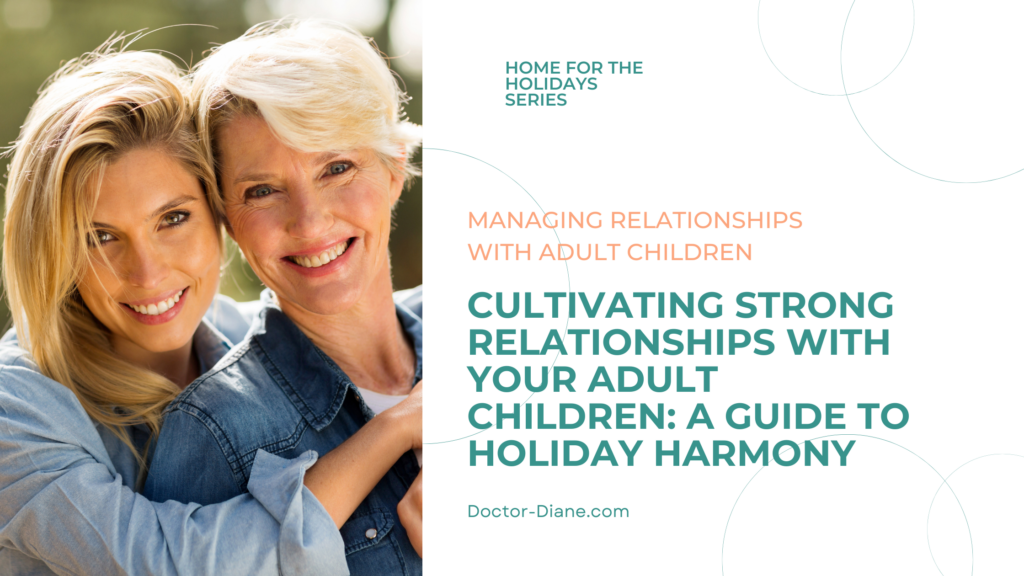Cultivating Strong Relationships with Your Adult Children: A Guide to Holiday Harmony
By Dr. Diane Strachowski, Licensed Psychologist, Relationship Expert, and Attachment Style Aficionado
Ah, the holidays—a time for cheer, laughter, and… generational misunderstandings. Whether you’re in the thick of the “sandwich generation,” balancing the needs of aging parents and adult children, or simply navigating the shifting dynamics of adult relationships with your grown kids, the holidays can bring about a unique set of challenges.
One moment, you’re sitting down to turkey dinner, and the next, you’re wondering, Why did my adult child just roll their eyes at me? It’s tempting to think they’re just being difficult, but the truth is, our evolving relationships with our adult children require tolerance, acceptance, and adaptation. And nowhere does that tension bubble up more than during the holiday season.
But here’s the good news: You’re not alone, and it’s entirely possible to turn those awkward moments into opportunities for deeper connection. Let’s talk about how attachment styles play into this, and more importantly, how we can all navigate the holidays with fewer misunderstandings and more lasting memories.
Tolerance: Bridging Generational Differences with Grace
First, let’s talk about tolerance. If you’ve found yourself growing impatient with your own parents’ quirks or beliefs—say, their need to talk about politics or their insistence on sticking to old traditions—you can probably relate to why your adult children sometimes struggle to get along with you.
Our children grew up in a different time, with different values, technology, and social norms, just like we did compared to our parents. When you think about it, the eye roll you give your parent when they ask for help sending a text is not all that different from your adult child’s frustration when you suggest everyone goes to church together. Generational gaps are real, and they come with differing values and priorities.
The same is true when it comes to relationships. Some of us still value tradition or family togetherness in ways that feel foreign to our children, who might prioritize flexibility or independence. Understanding these differences and allowing them space to exist is the first step toward maintaining long-term harmony. Acceptance means recognizing that while things may not look like they used to, that doesn’t mean the bond is broken. It’s just evolving.
Tip: Remember how you’ve learned to tolerate your own parents’ idiosyncrasies? Apply that same grace to your adult children. Tolerance is the bridge between misunderstanding and mutual respect.
The Role of Attachment Styles in Parenting Adult Children
Speaking of tolerance, attachment styles—those deep-seated patterns of how we relate to others—have a huge impact on how we navigate relationships with our adult kids. Let’s take a closer look at the four main styles and how they can play out during the holidays:
1. Anxious Attachment Style: The Over-Engaged Parent
If you have an anxious attachment style, you might feel a deep need to stay close to your adult children, even if it feels like you’re grasping at straws to keep the connection strong. You’re the parent who sends out detailed itineraries for holiday meals and activities, hoping that structure will keep everyone bonded. But in reality, this overplanning can come across as controlling.
What you’re really seeking is reassurance—confirmation that you’re still important in their lives. And guess what? You are! But in a different way than when they were kids.
Tip for Anxious Parents: Instead of trying to orchestrate the perfect holiday, take a step back. Allow your adult children some breathing room to engage with you on their terms. You might be surprised at how that space leads to more authentic connection.
2. Avoidant Attachment Style: The Hands-Off Parent
If you lean toward an avoidant attachment style, you might be the parent who stays emotionally distant, hoping that by giving your adult child total independence, you’ll avoid conflict. However, this can sometimes be perceived as disinterest or a lack of effort in maintaining the relationship.
For you, the holidays may feel like a minefield of expectations, but you don’t have to check out emotionally to keep the peace.
Tip for Avoidant Parents: Try to engage in small, meaningful ways. Ask your adult child how they’d like to spend time together during the holidays and show genuine interest. A little effort goes a long way, and your adult child will appreciate the connection.
3. Disorganized Attachment Style: The Unpredictable Parent
Parents with a disorganized attachment style may swing between anxious and avoidant behaviors. You might plan obsessively one moment and retreat the next, leaving your adult children unsure of what to expect from you during the holidays.
Your goal here is consistency. Emotional ups and downs can strain your relationship, so it’s important to find a middle ground where you’re involved but not overwhelmed.
Tip for Disorganized Parents: Stick to one plan—either schedule light activities or focus on spontaneous moments, but don’t do both. This will help reduce stress for everyone involved.
4. Secure Attachment Style: The Balanced Parent
Securely attached parents tend to have an easier time navigating the holidays because they are comfortable with both connection and independence. You understand that your adult child’s autonomy doesn’t mean rejection, and you know how to cultivate meaningful interactions without overstepping boundaries.
That said, even secure parents can benefit from being mindful during the holidays. Emotional triggers can arise, and managing expectations is key to keeping things smooth.
Tip for Secure Parents: Keep being the flexible, understanding parent that you are! Continue fostering open communication and encourage your adult children to express their needs. Your balanced approach helps everyone feel safe and valued.
Demotion: The Blessing and Curse of Parenting Success
One of the hardest parts of parenting adult children is realizing that, in some ways, you’ve been demoted in their lives. When your child gets married or starts a family of their own, you naturally take a step back in priority. But that doesn’t mean you’re any less loved or important.
As they navigate their own lives, your adult children may call or visit less frequently, and interactions may feel more dutiful than heartfelt at times. But here’s the bright side: This demotion is actually a sign that you’ve done your job well. You’ve raised an independent adult capable of living their own life.
Tip: Accept that this phase is natural, and take pride in your role as their emotional supporter. Continue being their cheerleader, even if it looks a little different than it did when they were younger. Just because you’re no longer at the center of their world doesn’t mean you’re not in it.



